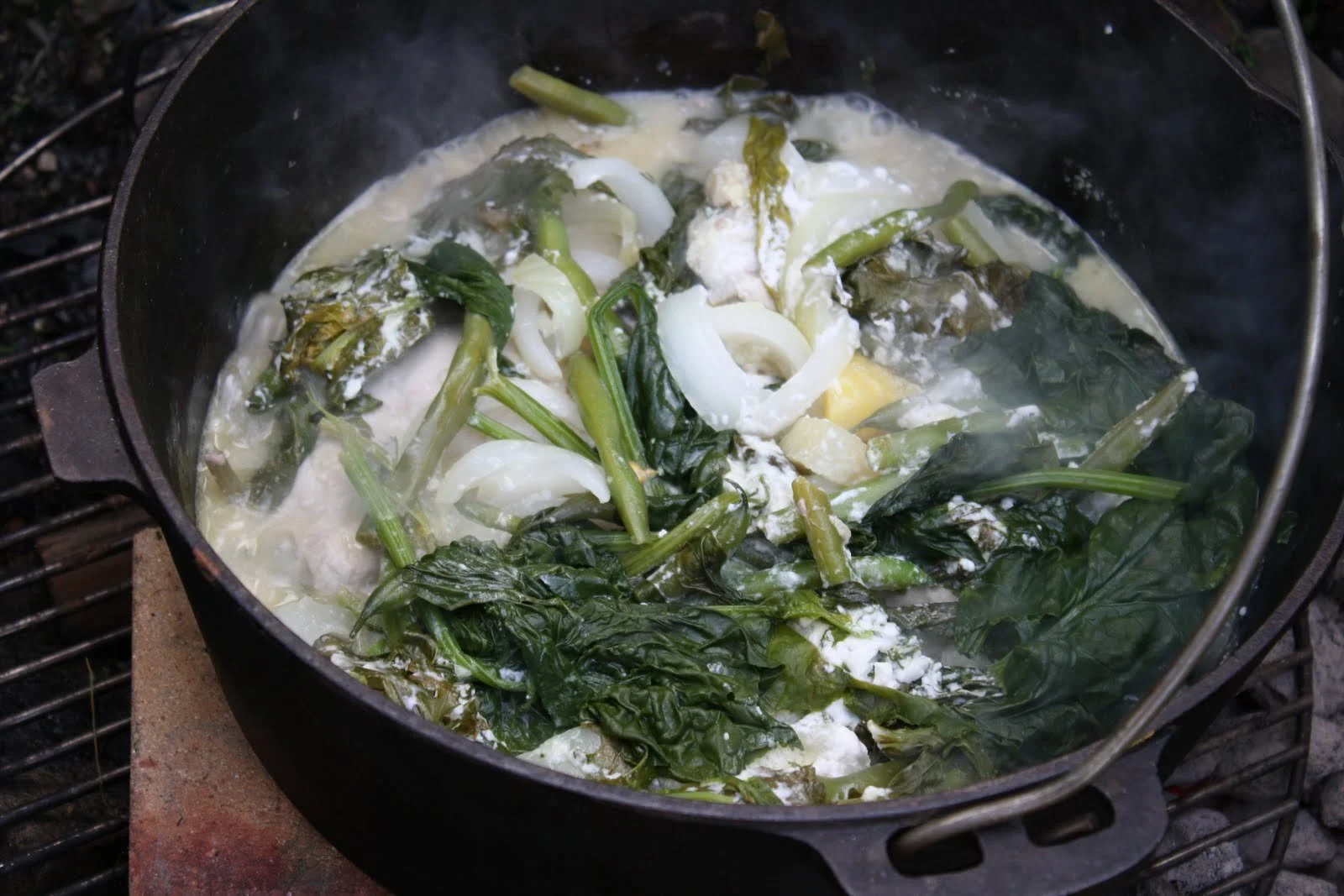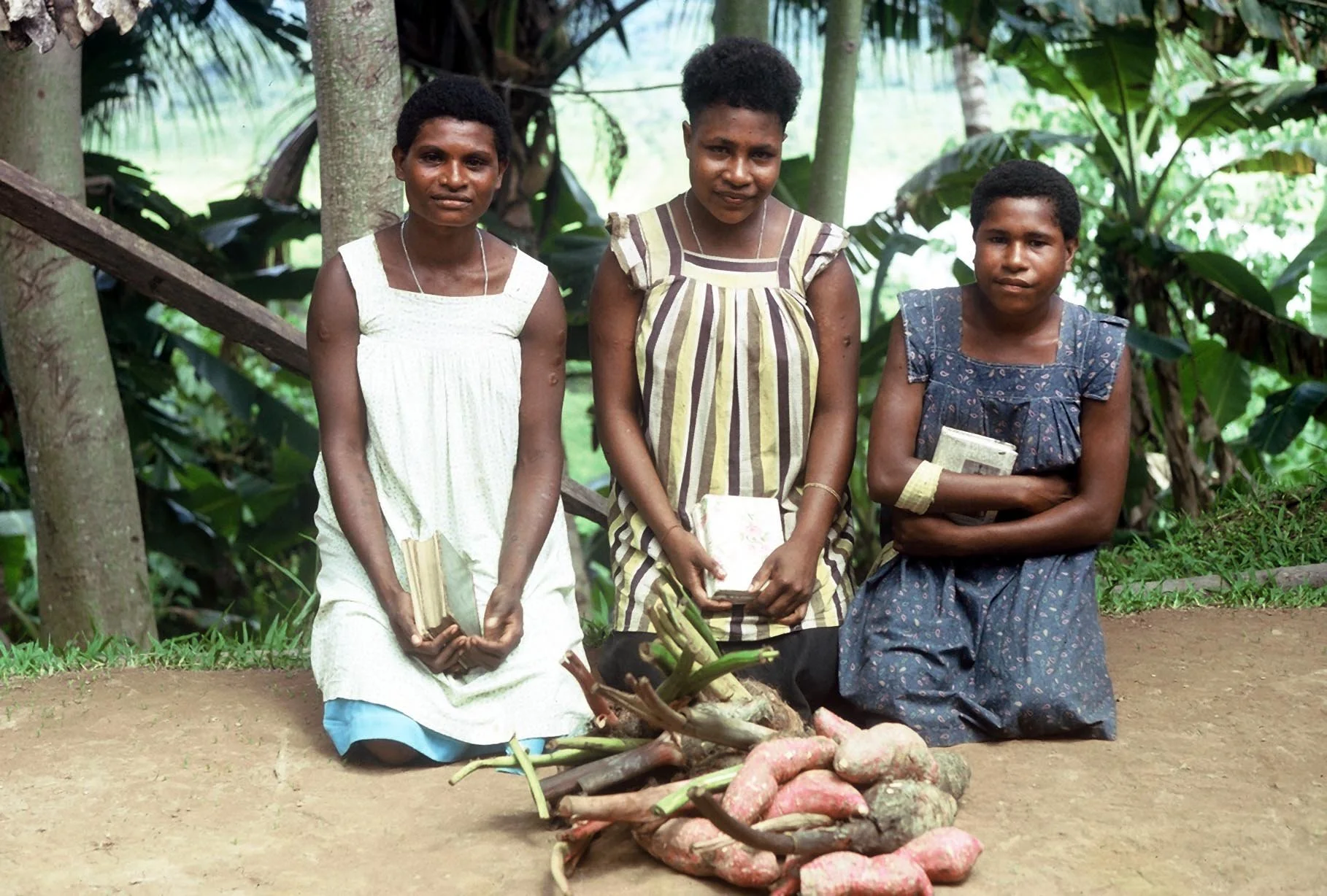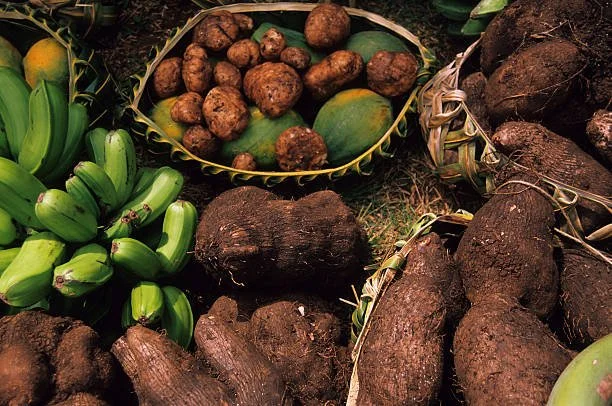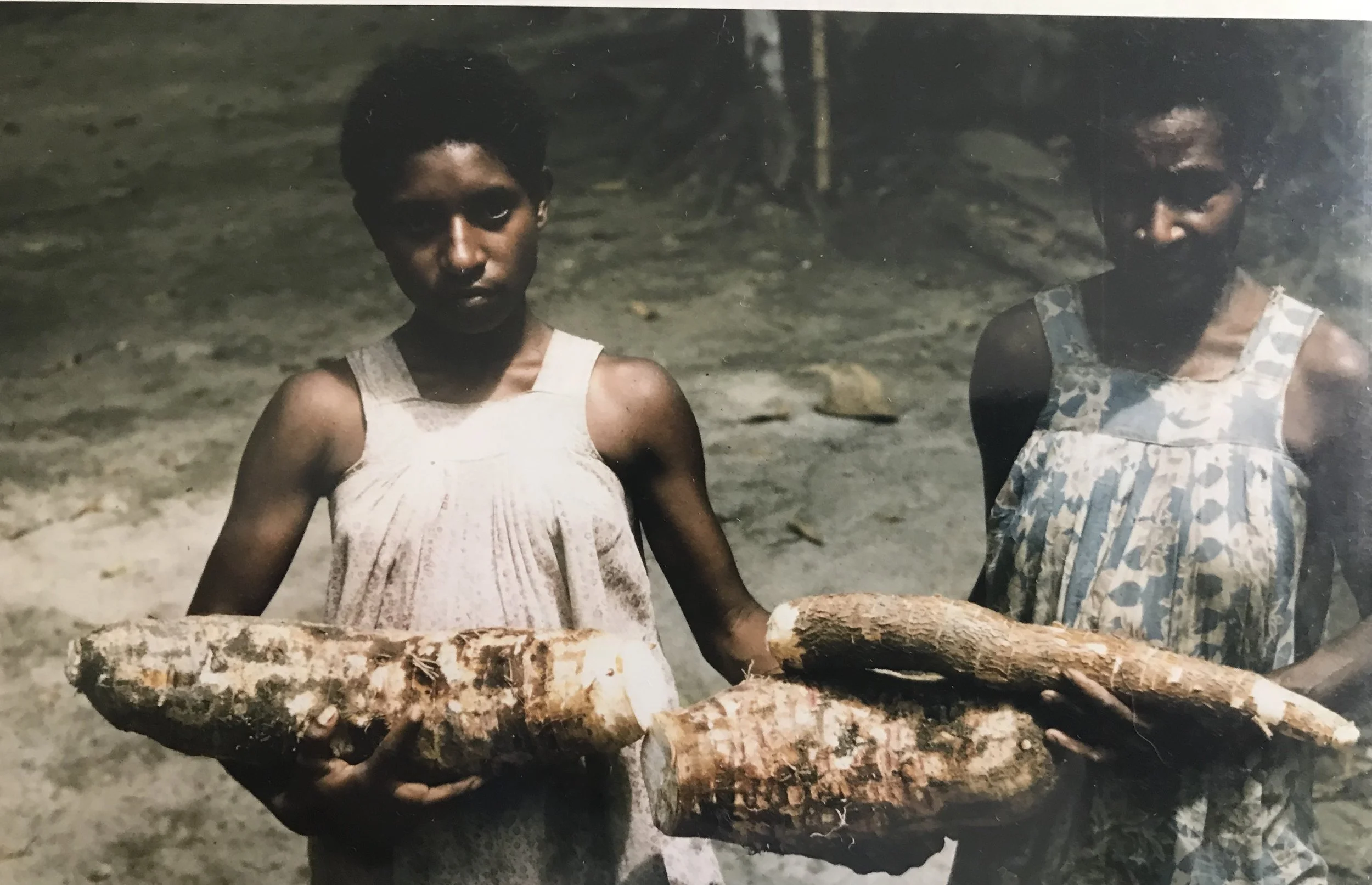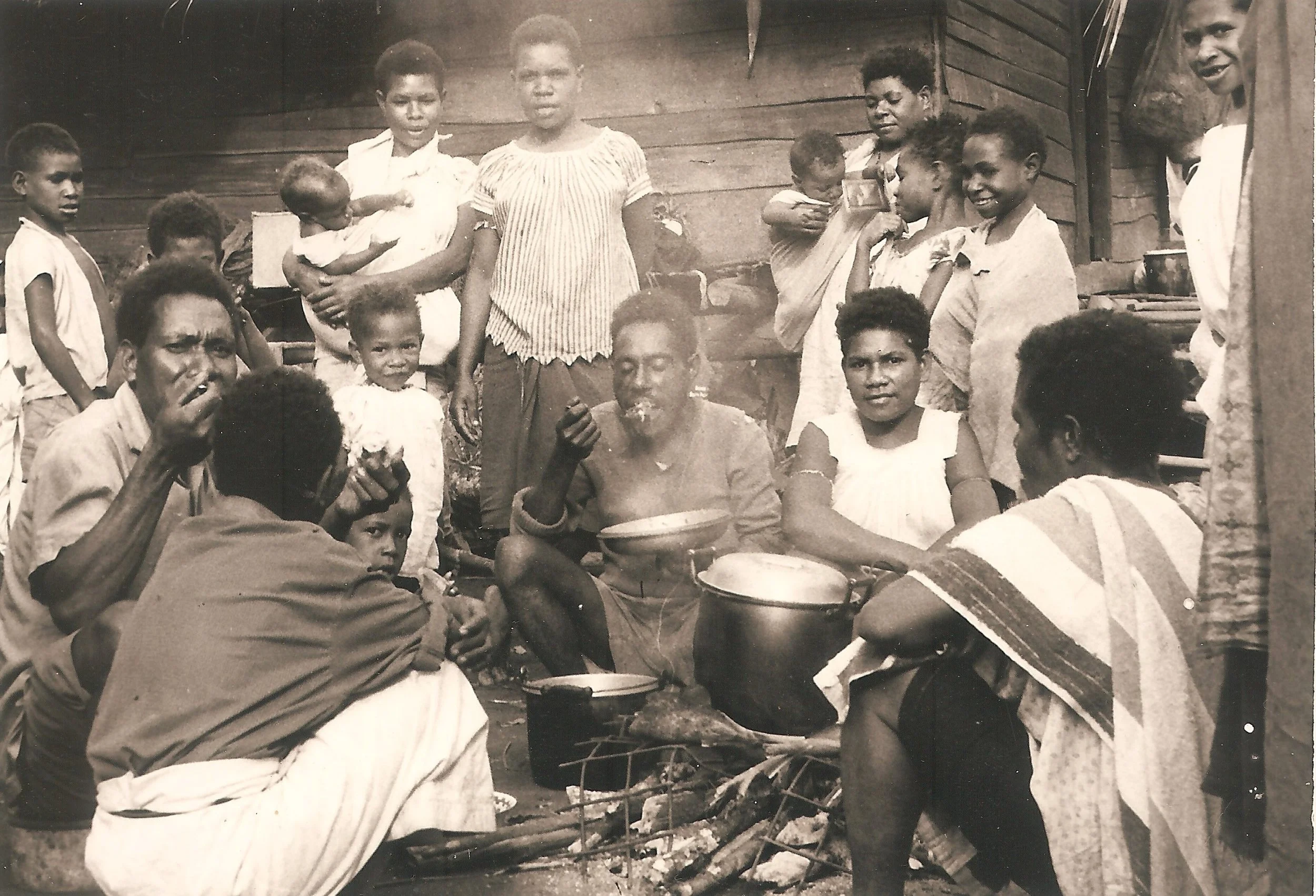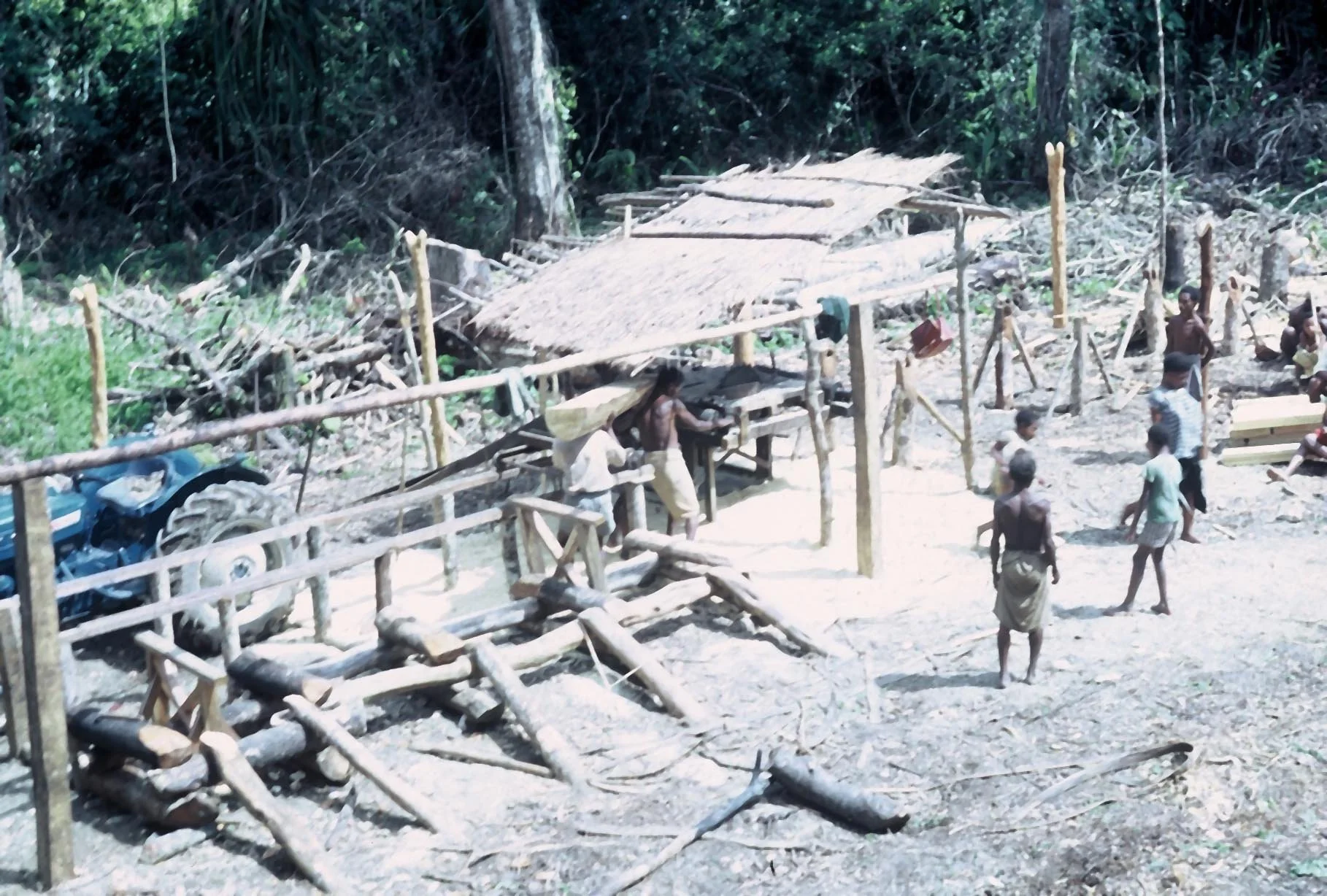The people earn their money mainly by gardening.
1963 April 4 (a copy)
Dear Mr. and Mrs. Rossbach, Jill, Wayne, and Douglas, (new sponsors from southern MN)
Thank you for your very warm letter. We were interested to hear that you are farmers. Neither of us came from the farm and we both wish that we had. We could both use the practice experience one gets there, especially as we are trying to raise cows and chickens and ducks. We haven’t been successful as the chicken still aren’t laying very well, but at least after a year we have been able to get the cows to get enough milk for our family. There were 12 cows, but we have butchered several, and some have died. We don’t have any acre of flat ground. It is all up and down so every once in a while, once falls off a cliff. We have no way of preserving the meat as even salted meat doesn’t keep very long and with the persistent earthquakes that breaks the jars, canning isn’t practical. We put in as much as our refrigerator freezer can hold and pickle and get the meat to the rest of the natives that live in the station with us. The teachers, church secretary, nurses, carpenter and pastor. They rarely have meat besides fish, unless they get a wild pig once in a while so really enjoy it. When we butcher a cow we have a big feast eating all that we give them in one sitting as they can’t preserve it.
The people earn their money mainly by gardening. It is a very difficult job as most land goes up and down at about 45-85° angles. They usually use a plot for one or two plantings, and then cut a new spot as the heavy rains carry all of the topsoil with them. They must clear the bush each time to plant the garden, cutting down the big trees and cutting away the bush then they burn it all. They have to build pig fences around it all. Since wild pig get in and ruin the gardens. Put two posts in every 6 feet or so and then pile bamboo sticks one on top of another until it is about 3 feet high.
Here on the coast, they can raise some corn for eating, small potatoes, green beans that are about a foot-long and very tough and tasteless. Taro a potato like tuber is stable. They plant a sprout of this, letting it get big as we do with potato sprouts then it takes months before they get a crop. Sweet potatoes, not like our yams, are white vegetables, much like our potatoes. If I add a little sugar to it while boiling it, it taste much like white potatoes. They can grow cucumbers, watermelons, pit-pit which grows in a husk- like corn, but isn’t hard or has corn kernels, corn, baptes- little like cauliflower, a spinach-like vegetable with a very strong taste, called Motom, mango, oranges, lemon, coconut. Some villages make coconut into copra to sell by drying the white meat of coconut to make into oil for soap and shampoo. We also have papaya- a melon like fruit that grows on a tree, and when it is ripe, it is bright orange and has small round bead like black seeds inside. It has kind of a muskmelon like texture but taste different. At first we didn’t like it but now are very fond of them.
Banana’s come in great variety but our favorite ones are the ones we buy in the States. Some are hard and red and they can be cooked or boiled with salt like potatoes, some taste a little like strawberries, and are small and sweet and some are about a foot long, these are to be cooked with banana leaves. There is cocoa and rice. We would like to see them raise more rice as it grows very well, and they could say it to use when their gardens aren’t producing and they don’t have any food. It is an introduced product, so takes a while to catch on. Most of the lowland is marshy and good for growing rice. Cocoa is a lot of work. Shade trees must be grown first and then kept weeded regularly so not too many people grow it so it is a profitable crop. Then pineapples, of course. We have a small citrus fruit that is called a guava and the kids are crazy about it. We like it in jam. They have a palm tree that they have to cut down to get to the center of it. It is very starchy substance. It is much like cooked, tapioca. (Sago palm)
In the mountains, they can grow almost anything to grow in the States: peas, beans, carrots, beets, cabbage, lettuce, potatoes, green peppers, onions, eggplant, corn, loving kidney beans, peanuts, and our coffee is their big cash crop. Mountain people are really going to be able to make money, now that an airstrip has opened up for them, and they will be able to get their goods out and take them to Lae to market.
Here on the coast, they also do some lumbering. In fact, our congregation owns a small sawmill that does real well for its size. Fishing is an undeveloped area that we are very interested in developing. A town in Wisconsin where some friends here are from, just donated enough money to buy a large fishnet for the people of this area.1 There are three villages around us that don’t have good garden ground, so if we could get them going in fishing and then learn how to smoke them, they might be able to make a little better living. Now they take their garden vegetables to Lae which is about a 3 1/2 hour boat ride, they have to pay about a dollar for the boat, transport and very little above that at the market with vegetables, so it hardly pays them to go. In a way it is exciting to help develop the resources, and another way it is pure, hard work, changing tradition that have always been, so always should be done such and so, especially with so many changing things around them.
Now a little family news. Our children seem as different as yours. Paula Lynn is almost 3 years old is blonde and blue eyed, very different from her New Guinea playmates and Tommy almost 2, has dark brown eyes and a little curly soft brown hair. Our third one should arrive at early September if all goes well.
We are so grateful for our children, as they have been such a source of joy and contentment in a much frustrating world. They fit in very well, and feel very much at home. They have quite a few native children to play with. The teachers children are very clean and they good playmates. They enjoy the kids toys. I’ve been real amazed at all the playmates who had measles, mumps and chickenpox awhile ago and didn’t get any of it. Some of the kids had measles and mumps together and they were very sick.
I’ve been kept quite busy with our dispensary as there always seems to be sick people. Now I have two nurses and two nurses aids, which can do most of the routine work, but I must help out with emergencies of which there are quite a few.
As we learn the people and their language, we will enjoy it more. I think the language has led to more frustration than any other obstacles. We had no time for long to study before we were plunged in. We were with another missionary for one month (Horrolt) before he left on furlough. There, we were trying to be missionaries to 9000 people or savages and couldn’t speak to a single one. Al bought a book on pidgin English, a kind of language that most of the men know. It is quite a vulgar language so any woman that knew it is a naughty girl, but this has changed a lot now. Anyway, Al was trying to give talks six weeks after we arrived. He visited many villages, but we didn’t know customs, or what was going on. There were quite a few murders within the villages after the other missionary left. The government didn’t have much control in the area. These people were still practicing cannabilism during Second World War. (referring to the Guroker area)
It was learned that the former missionary would be coming back, so they decided to move us to a more civilized area, Malalo, and move an experienced missionary from Malalo into that area –(Gurakor and Mumeng). We are now in a place where several teachers know English fluently and have been able to help us with Jabem. This is the church language for this area. There are eight different languages spoken in this area and we only speak Jabem. Nearly everyone knows it besides their own language. Fortunately Jabem isn’t real difficult so we have been able to pick it up, quite well.
We are grateful for your partnership in our mission and we pray that God blesses you.
Love, Ina
Footnote:1Ina is referring to her new friend Inez Ramin. The Ramins just arrived to New Guinea in 1962 and spent Christmas with the Ericksons at Malalo.
Ramin, Robert, Inez. Administration 1962-1973 and have 4 children. Bob was the Mission Comptroller in Lae. Inez was from Amery, Wisconsin and one of Ina’s best friends from Lae. At Christmas, Inez asked what do the people need here that I can write back to Amery WI. A few months later she received $400 from them. So Alvin was able to get fishnets from Madang Supply house. He sold the fishnets to the New Guinean villages at half price. Busameng, Buakup and another he does not recall. This was important that the people had an investment in the project. Al kept one special net for the Station to catch fish for the students. It eventually was ruined by a hammerhead shark that got caught in it. The fishnets eventually fell into disrepair. But others watched this whole thing and eventually bought their own fishnets, learned to keep them repaired and were successful in their fishing business. This included purchasing a generator and freezer to keep extra fish for selling at the market.
Likely scene from a costal village. Notice the planks on the side of the house. That would have been from the Sawat sawmill.
1963 April 29 -a copy
Dear, Mrs. Ripdahl,
Jan said she received a letter from you about the New Guinea sewing project. I’ll just tell you a little bit of our experience with it. Each year and mid November we get about six large gunny sacks filled with clothes to distribute to our teachers, preachers, evangelist, boys, and girls, in higher education, or any other church workers such as carpenters and church secretaries. Those employed by the missionaries. Each man gets a white lap lap and a colored one. Each woman, a dress and children dresses or pants, depending upon their ages. Most of the church workers are paid by the native churches, as their salaries are very low, averaging about $30 a year. So if they have a large family, it doesn’t buy very many clothes for them. They look forward so much to their Christmas bundles and this is all the clothes they have especially for those in the highlands where it can get quite cold and they get, the shirts and sweater shirts.
Organizing the gift bags. Each one is wrapped in a cloth that can be used as a laplap.
Storing clothes in New Guinea is a problem as things mildew so very rapidly and cockroaches, raise havoc with clothes also.
I think what you might have heard about is that the government forbids any used clothing to enter the country. Any used clothes entering is automatically taken and burn. I can’t even have my mother send my maternity clothes here. I guess they are afraid of boarding pests. As the economy improves bit by bit, it is our task to teach these people to pay their own way.
Letters end here….
Meeting at the Malalo yard. Alvin Erickson standing
1963 April- a copy
Dear Lynn, Phil, Rob, and Jeff, (Van Diens – godparents to the kids)
We surely are happy that you broke your silence. We did get your tape and we are so happy to hear familiar voices that I think we both had tears in our eyes as we listened. We sat down in fact, and started to tape for you immediately. We were telling you about life in New Guinea, and then discovered we’d run out of tape a half hour back. We and the kids talked to you, but Al hasn’t really been around to finish off the tape, but maybe someday we will get it sent to you.
I suppose since you are the guardians of our children, we should ask you before we have more, but without consulting you and hoping you wouldn’t mind we’ve decided to try to add another one to the family. Two was so good that one more should be much better. The first few months were pretty rough, but now that is all behind, and we are eagerly anticipating its arrival in the early fall.
Many things have happened since our last correspondence with you, so I’ll just try and hit up on a few of them. Al just got back from a trip into the area that was building an airstrip. (Buangs- Wagua) The government decided to take the strip over that he was going to work on, and really made it into an airstrip. It is completely level which really meant a lot of work for the natives. Carrying by hand, bags full of dirt, 2 feet thick and 2000 feet long which has to be completely level. It should be open to use in just a few weeks. While up there he discovered our pastor and teachers that have just moved up there from the coast are about freezing as the weather can be quite cool, so they were happy to hear about your sewing projects of warm clothes. They really need them.
Building the airstrip at Wagua in the Buangs. This was the only area that had barely enough flat land for an airstrip. This tractor is one Fred Scherle helped get for people in Wagua. They used it to cut timber so they could get lumbar.
Phyllis, our teacher, and the kids and I plan to go with Al when he goes back to the area and early May. I haven’t been on a bush trip yet so I am really anticipating it a lot. Every other trip has fallen through as the kids have gotten sick or the boat wouldn’t work or some medical emergency came up just as we are leaving or company has come, so I’m planning on going, but nothing that I’m counting on until we actually arrive. There seems to be more obstacles, when it comes to planning on going somewhere.
We are glad to hear of your deepening spiritual life, and they awareness of the need of God in your fellow employees at hardware. It is very interesting but we have noted in letters from friends throughout the states that there seems to be a reawakening and thirsting for the real meat of the gospel. It really does look like the last times, it would be exciting to have this come to pass in our day. Though we should expect it each day for us personally, as we never know from moment to moment, which might be our last. But I mean, as that each of us should be prepared to die each day.
Keep up the preaching of Christ, as the only means of salvation, to your friends at mutual. It is hard for us to realize, for Bible reading people to arrive at such conclusion, though I know this persistent in a lot of churches. It really is enough to make one want to get up on a soapbox, may God guide your words. Al wants me to leave some space for him, I haven’t had time to tell you about our earthquakes, storms, etc. but maybe next time. God‘s grace be with you.
Your house sounds lovely. Ina.









